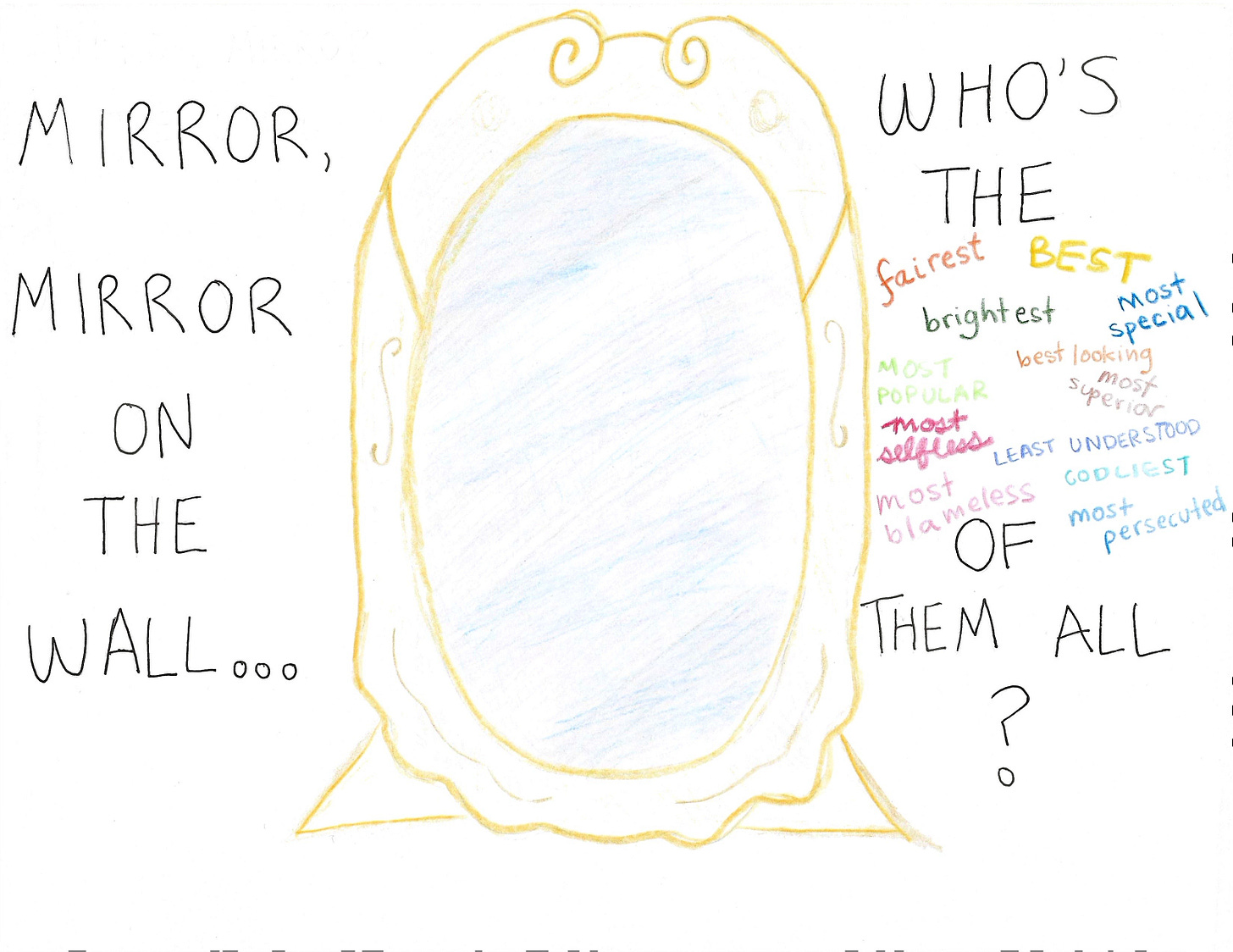Enough About Me...What Do You Think About Me?
Self-obsession and its effects
Hi Zan, Hi Pa
Volume #22
August 10th, 2024
HI, ZAN: I’d like to talk about narcissism. And since I’m interested in the subject, I know that you and our readers must be, too, because I’m sure everyone thinks like me. Don’t you agree with me?
HI, PA: Of course—the whole world revolves around you!
Hard to even imagine, because you’re so far from being a narcissist…
I love that the term comes from the Greek myth about Narcissus, who fell in love with his reflection in a pond and wasted away there, entranced by his own face. (Meanwhile, his suitor, Echo, was so beside herself that she faded away, leaving nothing but a whisper in the woods.) This story illustrates self-obsession so clearly that it inspired the term for a diagnosable personality disorder!
PA: Interesting. I am shamefully ignorant of Greek mythology, so thank you.
It’s a disturbing condition and ranges from the local guy on a barstool who’s convinced that his life, opinions, and medical issues are more interesting than anything else on Earth; to the demonic dictator, so wrapped up in his need for power and attention that he’ll torture, murder, start wars, and never feel the slightest twinge of remorse. Where does the narcissistic impulse come from, any thoughts?
ZAN: Well I think all of us are egotistical to some degree—our instincts teach us to act out of self-interest in certain situations and we all have some relationship to the “self.” But I believe there’s a spectrum, from those who maybe talk about themselves more than they ask about others, to people with full-on Narcissistic Personality Disorder (of which I think I’ve only really met one in my whole life).
My first assumption when I read your question was that the impulse comes from childhood. Those who were either completely ignored as children or raised to feel entitled and superior might tend towards self-obsession. But when I looked it up, I discovered that culture is also a factor—narcissism is more common in societies that prioritize individualism. How interesting is that?!
PA: Really interesting. I wouldn’t have guessed that to be the case, but it makes perfect sense. A society that prioritizes individualism probably puts more emphasis on competition than cooperation, and competition always involves comparison: I won, you lost. I’m better, you’re worse. More focus on the ‘I’ than the ‘we’.
As I’m sure you know, I’m usually the person defending men in certain kinds of discussions because I often feel that men receive more than their fair share of blame and criticism in many modern conversations. (We should argue about this in a future newsletter). But I have to admit that the vast majority of the narcissists I’ve known, I’d say 85 percent, have been men. Not so long ago, men were mainly the ones out in the competitive world, having to prove themselves, to compare themselves with other ‘breadwinners’, to ‘win’ in a certain sense. And women’s traditional role was in the home, a much less competitive environment. Have you also encountered more male than female narcissists? And, if so, why do you think that’s the case?
ZAN: Interesting! The one true—as in most likely diagnosable—narcissist I ever knew was a man. (I make that distinction because not everyone who is self-obsessed has Narcissistic Personality Disorder.) And it would make sense to me that narcissism comes easier to men, maybe not because of the competitive environment so much as the messaging that men received for generations that they were somehow better or dominant or entitled to success, while women were considered weak. To put it another way, men were the main characters in society for a long time, while women were relegated to supporting roles.
That being said, I think I’ve met a lot more self-obsessed women than I have self-obsessed men. Part of that has to do with looks—historically, the only real “power” given to women was that of our appearance. And I’ve met many women who like to wield that power, use it to play with men (or anyone else they’re attracted to) for their own entertainment. Do I think that’s a somewhat natural result of a society that has often belittled women? Yes. But do I think it’s harmful when it crosses from self-confidence into manipulation and self-worship? Also yes.
Where do you think the line is between confidence and egotism?
PA: I’ve met women like that. The older I get the more obvious it is that they’re ‘using’ their physical attractiveness in that way. A big turnoff for me, not that that matters at this point.
Interesting that you emphasize the aspect of society that has historically signaled men are entitled to success, while I emphasize the strain of having to compete, to be successful at all costs so as not to feel like a failure. To you it’s an entitlement, to me a burden. We should definitely do a whole Substack on this. . .or another one, because we did touch on some of this early on.
ZAN: That makes sense to me that we differ there—let’s definitely explore it in depth at another point!
Keep reading with a 7-day free trial
Subscribe to Hi Zan, Hi Pa to keep reading this post and get 7 days of free access to the full post archives.



